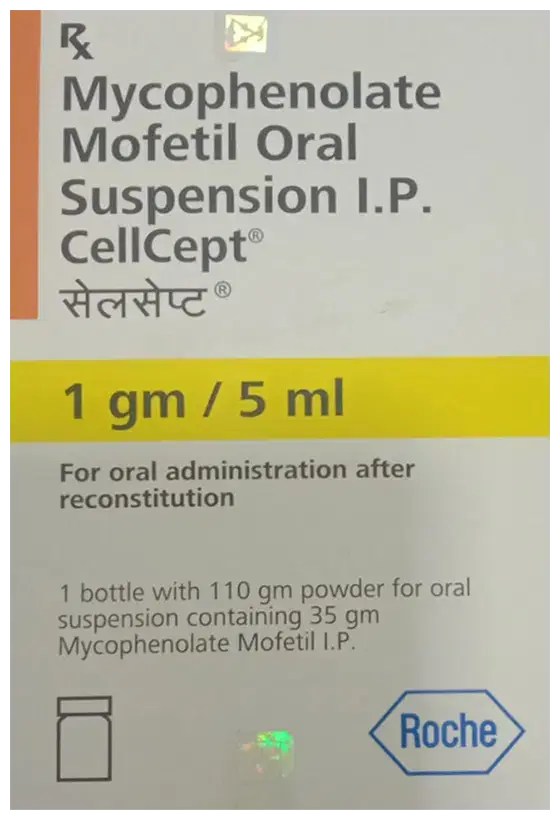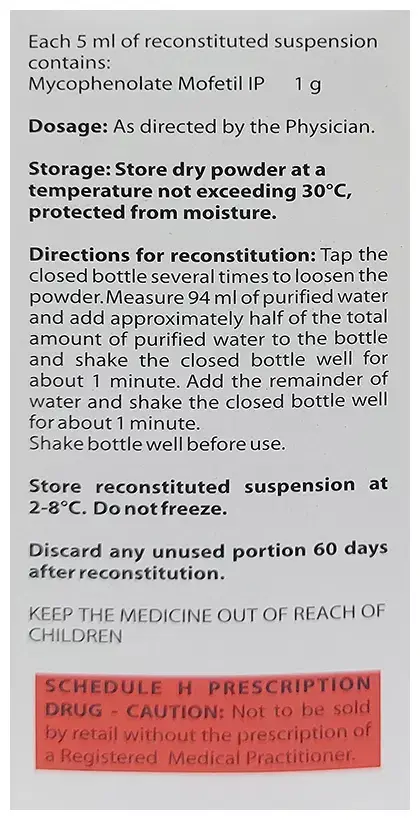Cellcept (Mycophenolate Mofetil) Oral Suspension
Branded
Generic
Mycophenolate Mofetil (Generic Equivalent to Cellcept)
Cellcept Oral Suspension belongs to a group of medicines called immunosuppressants. It is used with other medicines to prevent your body from rejecting an organ (such as a kidney, heart, or liver) after a transplant. It works by suppressing your body’s immune system so that it does not attack the new organ.
The amount of Cellcept Oral Suspension you take and how often you take it depends on the type of transplant you have. Follow your doctor’s instructions on this. You should take it on an empty stomach, at least 1 hour before or 2 hours after a meal. Swallow it as a whole, do not crush, chew, or break it. Take the medicine regularly to get maximum benefit and keep taking it even when you feel well. The treatment will continue for as long as you need it to prevent rejection.
The most common side effects are nausea, vomiting, diarrhea, stomach pain, headache, high blood pressure, and changes in the number of white blood cells. You may catch more infections than usual as medicine suppresses the immune system. There is also an increased risk of developing some cancers for this reason. To reduce your risk of skin cancer, limit your exposure to the sun and use sunscreen. There is a long list of potential side effects of this medicine. You should ask your doctor about them and what signs to look out for because some of them can be serious and need urgent medical attention.
Cellcept Oral Suspension can cause birth defects and abortion so do not take it if you are pregnant, planning to become pregnant, or breastfeeding. You should talk to your doctor before taking this medicine if you have any signs of infection or if you have any unexpected bruising or bleeding. You should also let your healthcare team know all other medicines you are taking as they may affect, or be affected by, this medicine. You will have regular tests to check for any changes in the number of your blood cells and the amount of sugar and cholesterol in your blood.
Uses Of Cellcept Oral Suspension
- Prevention of organ rejection in transplant patients
Benefits Of Cellcept Oral Suspension
In Prevention Of Organ Rejection In Transplant Patients
Cellcept Oral Suspension belongs to a group of medicines known as immunosuppressive agents. It lowers your immune response and reduces the chance of your body attacking the transplanted organ. Organ rejection happens when your immune system treats the new organ as an invader and attacks it. This medicine may be used in combination with other medicines to suppress the immune system and help your body accept the new organ.
Side Effects Of Cellcept Oral Suspension
Most side effects do not require any medical attention and disappear as your body adjusts to the medicine. Consult your doctor if they persist or if you’re worried about them.
Common Side Effects Of Cellcept
- Nausea
- Vomiting
- Diarrhea
- Abdominal pain
- Headache
- High blood pressure
- Decreased white blood cell count (neutrophils)
How To Use Cellcept Oral Suspension
Take this medicine in the dose and duration as advised by your doctor. Swallow it as a whole. Do not chew, crush or break it. Cellcept Oral Suspension may be taken with or without food, but it is better to take it at a fixed time.
How Cellcept Oral Suspension Works
Cellcept Oral Suspension is an immunosuppressant. It reduces the action of the body’s own defense system (the immune system) and prevents rejection of the transplanted organ.
Disclaimer :The information provided on the website is intended to facilitate awareness about healthcare products and medical conditions generally but it is not a substitute for professional medical attention or advice. You should always speak with a qualified healthcare practitioner before taking any prescription or non-prescription drug. |
| Product Type--Salt | Generic–Mycophenolate Mofetil (Generic Equivalent to Cellcept), Brands–Cellcept |
|---|---|
| tag--Manufacturer | Top Brand–Panacea Biotec, Branded–Roche |
| Power--Pack Size | 1gm/5ml–110gm in 1 Bottle (1 Bottle), 1gm/5ml–110gm in 1 Bottle (2 Bottles), 1gm/5ml–110gm in 1 Bottle (4 Bottles), 1gm/5ml–110gm in 1 Bottle (6 Bottles), 1gm/5ml–110gm in 1 Bottle (1 Bottle), 1gm/5ml–110gm in 1 Bottle (2 Bottles), 1gm/5ml–110gm in 1 Bottle (4 Bottles), 1gm/5ml–110gm in 1 Bottle (6 Bottles) |






